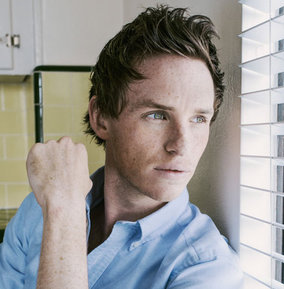Cari Lynn is an AwardsLine contributor. This article appeared in the Dec. 5 issue of AwardsLine.
From the first time Brit Eddie Redmayne saw the musical Les Misérables at 9 years old, he knew he wanted to be a part of it—only his sights were set on the role of the young street kid, Gavroche. Little did Redmayne know he’d grow up to be the leading love interest and French rebel, Marius Pontmercy. Although he’s a relative newcomer to musicals, Redmayne has an impressive lineup of stage, film, and TV credits both in the U.S. and England, including his lead role in last year’s My Week With Marilyn, and a 2010 supporting actor Tony for Red. But it’s his role in the highly-anticipated Les Mis that has critics buzzing about Oscar—not bad for someone who casually says he’s always enjoyed singing.
AWARDSLINE: You’d worked with director Tom Hooper before?
EDDIE REDMAYNE: I first met Tom on an audition for the HBO miniseries Elizabeth I (which Hooper directed), and he asked, “Eddie, have you ever ridden a horse?” To which I said, “Yes.” Cut to two weeks later, Helen Mirren is playing Elizabeth and there are 47 stunt horsemen behind me and I have spurs attached to my feet, and I’m like, “At what point do I admit having never ridden a horse in my life?” They call action, and I almost kill myself! Tom shouts, “You’re a bloody liar, Redmayne!” And it’s taken about seven years for him to consider employing me again. There are moments in (Les Mis) where I’m on a horse, and that’s basically Tom getting me back!
AWARDSLINE: What was the audition process like for Les Mis?
REDMAYNE: I’d heard (Les Mis) was happening, and I was filming (2011’s Hick), playing this Texan, meth-addict cowboy with a limp, and we were doing a night shoot. So I was in a Winnebago in the middle of nowhere and had a couple of hours, so I recorded myself a capella on my iPhone and sent it to my agents to let them know that I also sing because I didn’t think they were particularly aware of that. From then, it became what I can only describe as American Idol. The last audition was with (among others) Tom Hooper, Cameron Mackintosh (the original Les Mis producer), Alain Boublil (original lyricist), Claude-Michel Schönberg (original composer). Everyone went through that—Hugh (Jackman), Russell (Crowe), Amanda (Seyfried); it meant that when we arrived on set, we were bound by the fact that we’d all really worked hard to get the part. No one had just coasted in.
AWARDSLINE: How did you prepare for this role?
REDMAYNE: I’ve always loved singing. What’s so wonderful about our job is that once I got that part, I got to work with this extraordinary singing teacher in London, Mark Meylan, who put me into a full-on, physical vocal workout for the next few months to get myself to a place where I could sing “Empty Chairs at Empty Tables” back to back 20 to 30 times.
AWARDSLINE: You’d sing the entire song for each take?
REDMAYNE: Yes, but I was very lucky because “Empty Chairs at Empty Tables” was just me in a room. It was a closed set. It was very quiet. It’s exactly the way I like to work on something so emotional, and this song is about extraordinary survivor’s guilt. I would ask Tom to keep the camera rolling, so we would do a take then go straight into another. We did about seven takes, and Tom said, “I think we got it,” but I was like, “No, no, no, we have to keep doing this until there’s blood coming out of my eyeballs.” I’m never particularly happy with my work when I see it, and I just knew that if I’d given it every ounce I had then I couldn’t flagellate myself too much later. So I ended up doing about 25 takes, and interestingly, Tom said the take he used was the last one.
AWARDSLINE: Is it true that, technically, you weren’t the only Marius on set?
REDMAYNE: A lot of the (men playing students in the barricade) had been in the London production of Les Mis, and you know they’ve witnessed the musical sung so many times, so there was an apprehension about that, and after a few days I’d realized that seven of them had played Marius. Obviously, that made me mildly terrified, but they were incredibly generous, and it was wonderful to be able to talk with them about how they interpreted things or about moments I was struggling with. It became a dialogue, and you felt a camaraderie.
AWARDSLINE: You’ve had a lot of stage and film experience, was this different than anything you’ve done before?
REDMAYNE: It felt like the accumulation of all of that, like I had to use all I’ve learned and try to accrue it into one specific scenario. And the idea you had to train your voice to sing loudly, but then there was the intimacy of a close-up—you could give it that belt, but you didn’t want the camera to be looking down your tonsils. Also, I learned how you could draw an audience in with stillness, and I realized there are parts of songs that could be stronger if done sort of half-spoken. What’s amazing is that it felt new to everyone. Hugh was obviously the extraordinary protagonist, but it felt more like an ensemble than anything I’ve ever done because we were all asking each other for advice and all helping each other. The musical is about riot and war, and it’s starring Wolverine and Gladiator, and yet we’re all walking around (doing odd-sounding vocal warmups and facial exercises). The poor production teams had to get lifetime supplies of honey and lemon and humidifiers.

